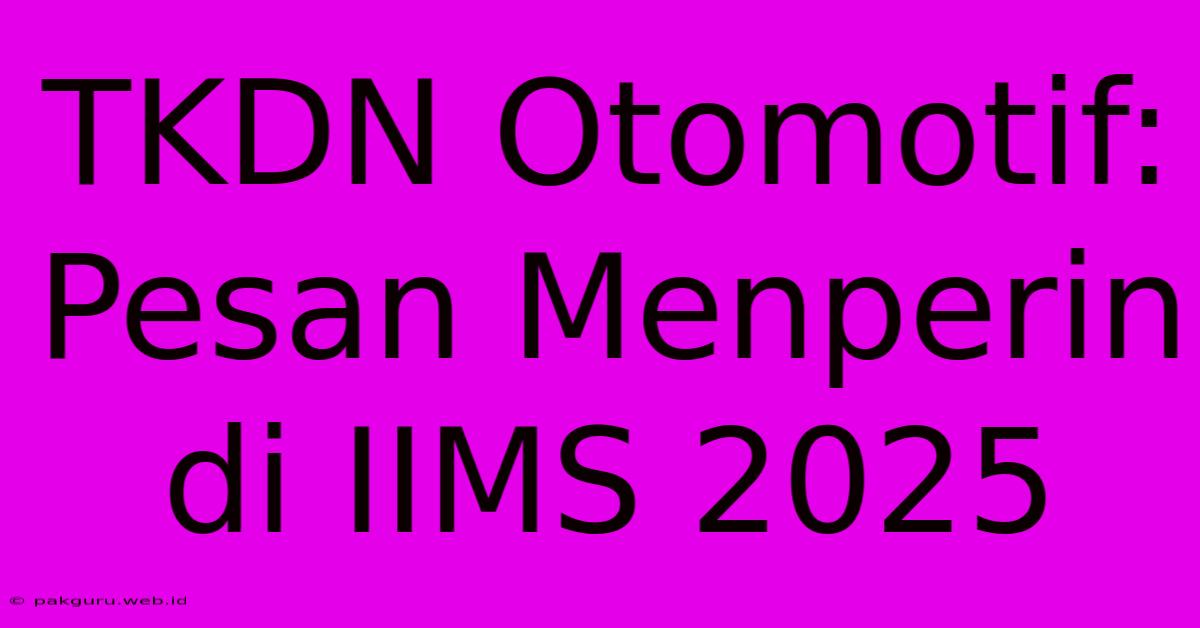TKDN Otomotif: Pesan Menperin Di IIMS 2025

Discover more detailed and exciting information on our website. Click the link below to start your adventure: Visit Best Website wanagama.com. Don't miss out!
Table of Contents
TKDN Otomotif: Pesan Menperin di IIMS 2025
The Indonesia International Motor Show (IIMS) 2025 is expected to be a significant event for the Indonesian automotive industry. This year's show will likely feature discussions around the crucial topic of Tingkat Komponen Dalam Negeri (TKDN), or Domestic Component Level, for the automotive sector. The Minister of Industry's (Menperin) message at IIMS 2025 regarding TKDN will undoubtedly set the tone for future industry development and investment. This article delves into the anticipated key messages, the importance of TKDN for Indonesia's automotive future, and the implications for both domestic and international players.
The Significance of TKDN in the Indonesian Automotive Industry
TKDN is a vital metric measuring the percentage of domestically sourced components used in the manufacturing of vehicles in Indonesia. A higher TKDN signifies greater reliance on local suppliers, boosting the domestic economy, creating jobs, and fostering technological advancement within the country. The government's focus on increasing TKDN in the automotive sector is a strategic move to achieve several crucial objectives:
Economic Growth & Job Creation:
- Stimulating Domestic Industries: A higher TKDN necessitates the growth of supporting industries, creating a robust automotive supply chain within Indonesia. This reduces reliance on imports and strengthens the overall economy.
- Employment Opportunities: Increased domestic production translates into more jobs, not only in manufacturing but also in supporting sectors like logistics, research & development, and after-sales services.
Technological Advancement & Self-Reliance:
- Technological Transfer: Collaboration with international automotive manufacturers with high TKDN requirements can lead to technology transfer, accelerating the development of local expertise and capabilities.
- Reduced Import Dependency: A strong domestic automotive industry reduces dependence on imported parts, enhancing national resilience and economic stability, particularly in times of global uncertainty.
Environmental Considerations:
- Sustainable Practices: Promoting domestic production can encourage the adoption of sustainable manufacturing practices and the use of locally sourced, environmentally friendly materials.
Menperin's Expected Message at IIMS 2025: A Look Ahead
While the exact content of the Menperin's message at IIMS 2025 is yet to be revealed, we can anticipate several key themes based on current government policies and industry trends:
Aggressive TKDN Targets:
The Ministry of Industry is likely to reiterate its commitment to achieving ambitious TKDN targets for the automotive sector. This may involve outlining specific timelines and incentives to encourage manufacturers to increase the use of domestically sourced components.
Support for Local Suppliers:
Expect emphasis on government programs designed to support and strengthen local suppliers. This could include initiatives such as funding for research and development, capacity building programs, and easier access to financing.
Attracting Foreign Investment:
While promoting local content is paramount, the message will likely also emphasize the attractiveness of the Indonesian automotive market for foreign investment, particularly from companies committed to high TKDN levels.
Electric Vehicle (EV) Focus:
Given the global shift towards EVs, the Menperin’s address will almost certainly include a strong focus on TKDN for electric vehicles and their components. This will likely involve incentives and support for the development of the EV supply chain within Indonesia.
Implications for Stakeholders
The Menperin's message at IIMS 2025 will have significant implications for various stakeholders:
Automotive Manufacturers:
Manufacturers will need to adapt their sourcing strategies to meet the increasing TKDN requirements. This may involve investing in local suppliers, establishing joint ventures, or developing their own domestic production capabilities.
Local Suppliers:
Local suppliers will need to improve their competitiveness to meet the demands of automotive manufacturers. This requires investment in technology, quality control, and capacity expansion.
Consumers:
Ultimately, a higher TKDN can lead to more affordable and accessible vehicles for Indonesian consumers, while supporting the national economy.
Conclusion: TKDN – A Cornerstone of Indonesia's Automotive Future
The Menperin's message at IIMS 2025 concerning TKDN will be a defining moment for the Indonesian automotive industry. By fostering a strong domestic automotive sector through increased TKDN, Indonesia aims to achieve economic growth, technological advancement, and enhanced national resilience. The coming years will be crucial in witnessing the successful implementation of these ambitious goals. The IIMS 2025 event provides a critical platform for outlining the roadmap and galvanizing stakeholders towards achieving this vision.

Thank you for visiting our website wich cover about TKDN Otomotif: Pesan Menperin Di IIMS 2025. We hope the information provided has been useful to you. Feel free to contact us if you have any questions or need further assistance. See you next time and dont miss to bookmark.
Featured Posts
-
Momen Penentu Brugge Hadapi Atalanta
Feb 13, 2025
-
Celtic Vs Bayern Kane Menangkan Die Roten 1 2
Feb 13, 2025
-
Celtic Vs Bayern Kemenangan Tipis Raksasa Jerman
Feb 13, 2025
-
Copa Del Rey Barcelona And Atletico Bertemu
Feb 13, 2025
-
Brugge 2 1 Atalanta Kekalahan Pahit
Feb 13, 2025
